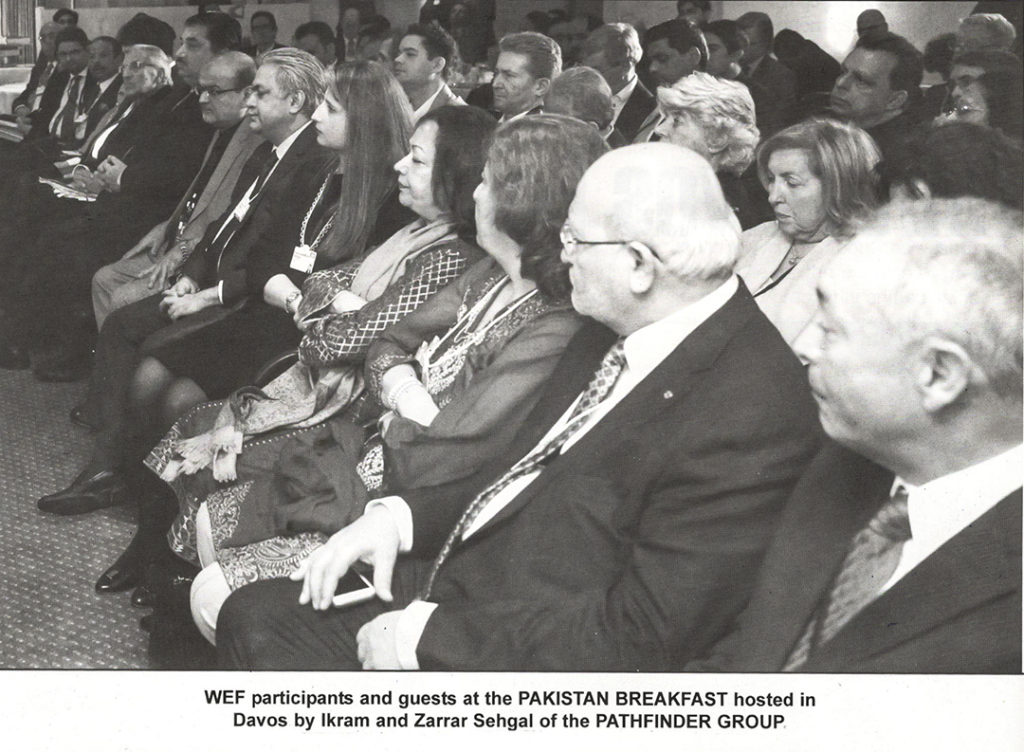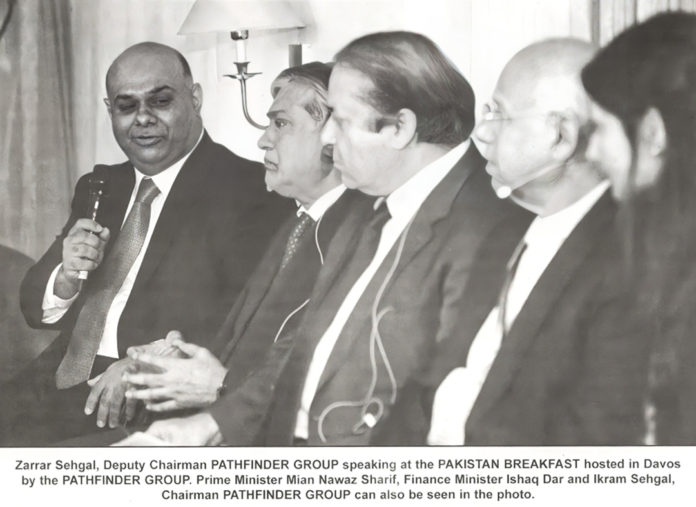Headquartered in Geneva, the World Economic Forum (WEF) is independent, impartial and not tied to any special interests. For progress to happen, people from all walks of life with drive and influence must come together to make positive change. Committed to improving the state of the world, this rather extraordinary international organization for public-private cooperation carefully blends and balances the foremost political, business and other leaders of world society to shape global, regional and industry agendas.
Over 2,500 leaders from business (representing hundreds of WEF member corporate companies), government and international organizations, civil society and religious organizations academia, media and the arts are meeting in Davos from 19 to 23 Jan participating in over 250 sessions with over 100 webcast live. The theme of the 46th WEF Annual Meeting in Davos is “Mastering the Fourth Industrial Revolution”. Prof Klaus Schwab, Founder and Executive Chairman WEF, says that there are many challenges in the world today, to quote “one of the most intense and impactful will be shaping the ‘Fourth Industrial Revolution’ – driven by the speed, the breadth and the complete ‘systems innovation’ of technological change underway. The challenges are as daunting as the opportunities are compelling. We must have a comprehensive and globally shared understanding of how technology is changing our lives and that of future generations, transforming the economic, social, ecological and cultural contexts in which we live. This is critical, in order to shape our collective future. To reflect our common objectives and values,” unquote.
According to WEF’s Global Risks Report 2016 for both impact and likelihood over a 10-year time horizon. Almost 750 experts assessed 29 separate “Global Risks” on the rise in 2016, the failure of “climate change mitigation and adaptation” having greater potential damage was considered the major risk, in order of priority thereafter, weapons of mass destruction, water crises, large scale involuntary migration and severe energy price shock. The likelihood of the number one risk is large’-sale “involuntary migration”.
As a domain of warfare in terms of likelihood and impacting on others, on par with land, sea, air and space, Cyberspace is being discussed in detail. For some reason critical information infrastructure failure as a technological risk appears to be declining. With their supply chains spanning many countries businesses are particularly vulnerable as internationalization increases their exposure, global risks does not recognize borders. Combined with energy price, unemployment and underemployment remain major concerns.
The pace of economic and technological change is leaving most political and regulatory systems unable to cope, spurring dis satisfaction with leaders and increasing polarization in society, already weakened by a steep fall in social cohesion. Decline in trust negatively affects all aspects of society, resulting in part from a steady increase in inequality, undermining the feeling essential to the fabric of society of all citizens being “in the same boat”. Polarization and growing populism forces leaders of third world countries and even “emerging nations” to take ill-advised and short term grandiose projects to give the appearance of “doing something” without really taking grassroots socio-economic initiatives.
The world is at risk “sleepwalking” into a future of widening chaos with growing danger of interstate conflict. Today’s wars are not confined to the battlefront itself but are “glocal” , while most of the fighting takes place in a specific region, accompanying terrorist attacks can happen ·any where . States or non-state actors exploit popular mistrust of government to influence individuals directly via social media. Sophisticated recruitment campaigns and social media-based information warfare has become genuinely global, with fighters from over 100 countries involved in Syria and Iraq. Joining the battle for ideological or personal reasons is just a click away from a teenager’s computer anywhere. Challenged by everything from well organized, stealthy groups to self-radicalized “lone wolves”, intelligence services are struggling to cope with this new reality.

Terrorist attacks and interstate conflict notwithstanding, the face of warfare itself is changing. Asymmetric, ambiguous grey zone and non-linear, “Hybrid warfare” has become the conflict mode of choice between major powers seeking to keep their rivalry below the threshold of what is legally defined as “war”. Deniable or indirect ways to influence events, including the use of proxy forces and “false flag” operations, are gradually becoming the norm. States also use economic relations, sanctions, trade regimes and physical blockades of borders for the purpose of geopolitical rivalry.
The decline of cohesion and trust between countries and societies -could lead to withdrawal of countries from an integrated and interlinked world, the 21st Century equivalent of medieval “walled cities” offering a sense of security and order as a means of protection from the “sea of disorder” on the outside. This in essence is the “nouveau fascism” that the present leader (by recent poll numbers) of the Republican pack in the 2016 US Presidential Elections, Donald Trump, is espousing. Inability to manage the reality of immigrants has led to strong demands to undo some of Europe’s primary successes of integration, like the “Schengen” open borders agreement.
There is an increase of fragility and disintegration on the one hand, and strategic competition between strong and well-organized states on the other, like the conflicts in Syria, Iraq and Yemen, with Iran and Saudi Arabia competing over who would dominate the future order of the region. Major global players are simultaneously competing and cooperating, on opposing sides in the battle while conversely seeking to forge diplomatic compromises.
Among the world leaders participating in Davos 2016 are US Vice President Joe Biden, Secretary of State John Kerry and Secretary Defence Ashton Carter, British PM David Cameron, Canadian PM Justine Trudeau, Afghan President Ashraf Ghani, Turkish PM Ahmet Davutoglu, Sri Lankan PM Ranil Wickremesinghe, South African President Jacob Zuma, German President Joachim Gauck, Israeli PM Benjamin Netanyahu and dozens of other Heads of State and Govt. Business leaders include Alibaba’s Jack Ma Yun, Dells’ Michael Dell, Perot Companies Ross Perot Jr, Hewlett Packard’s Meg Whitman, Bill Gates of Microsoft, Sheryl Sandberg of Facebook Inc, Ya-qin Zhang of Baidu.com, etc.
Fresh from his mediation effort in the potential Saudi-Iran conflict, the presence of the Pakistani PM Mian Nawaz Sharif at our PAKISTAN BREAKFAST in Davos today is a highpoint for Pakistan. Accompanied by Finance Minister lshaq Dar, Commerce Minister Khurram Dastagir, etc., his networking is a major plus for the country. With over 180 confirmed acceptances enthusiastically trying to fit into the 130-seating SCALETTA ROOM at the STEIGENBERGER BELVEDERE, the early start of the Breakfast (7:00 am) and possibly heavy snow falling will hopefully keep some of the invitees away. Starting 2002, our GROUP has proudly hosted this traditional PAK ISTAN event more than a dozen times, Javed Akhai of Martin Dow Chemicals has generously sup ported us since 2014. Besides wonderkid Abraaj’s Arif Naqvi, industry titan Hussain Dawood and Oscar winner Sharmeen Obaid Chinoy, Mushtaq Chapra is representing TCF, Nauman Dar Habib Bank, my son Zarrar Sehgal Pathfinder Group and Ali J Siddiqui JS Group. Davos is an unique opportunity to showcase Pakistan, but the Pakistani PM’s. solo net working is not enough, our major business leaders must come to the world stage at Davos and be counted for the outstanding entrepreneurs they are.




